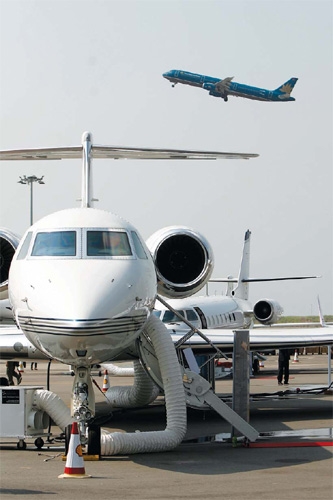Where the sky's the limit
Updated: 2011-01-07 11:08
By Wang Zhuoqiong (China Daily European Weekly)
Private jet makers are poised to ride on rising wealth and opening-up of chinese aviation sector
Business jet manufacturers are gearing up for more sales to the Chinese super rich, enterprises and celebrities on the back of a rapidly growing economy.
The opening-up of the country's low-altitude airspace in November also signaled its move to speed up the commercial and regional aviation sector.
General aviation and small airplanes are part of the first few steps leading to more aircraft purchases.
|
 Business jets on the runway at an aviation expo in Hong Kong in 2009. Xiao Yun / for China Daily |
"It is a positive step and I am delighted to hear that," David Dixon, the regional vice-president, Asia Pacific & South Asia, Business Aircraft Aerospace of Bombardier, says on the increasingly user-friendly aerospace rules and regulations in China.
Three years ago, the company projected 10 to 25 planes for the industry. That has now has been revised to 600 airplanes over the same period.
"The changes in awareness, regulations and people's need to travel overseas have boosted the potential for more airplanes," Dixon says.
He adds that the business used to be merely in inbound travel and business trips from international companies in China. Now, as Chinese companies go global, customers have seen the benefits of having their own planes. "It is moving in two directions," he adds.
Bombardier has 27 percent of the business jet market in China. The company estimates that the demand for 10,500 business jet deliveries worldwide, worth $254 billion (193 billion euros) of revenue for the years 2010-2019, which include 14,425 deliveries for the Asia-Pacific and among which 600 are for China.
In the next two decades, there will be 26,000 deliveries worldwide with revenues of $661 billion forecast. The market has been dominated by North America for the last 10 years but now it is the emerging countries that are taking the lead. The shift is also driven by the sharp increase in inbound travel by Western companies' expansion plans to emerging countries.
While there are more than 27,000 private jets globally, China has about only 60 private jetliners. With the opening up of low-altitude airspace and private flying, it is estimated that the Chinese mainland will become the fastest-growing business aviation market with demand of between 600 and 1,200 business jets and an annual revenue of 60 billion yuan (6.9 billion euros).
Leading private business jet manufacturers including Bombardier, Dassault and Embraer have all been expanding their presence in China. Dassault Falcon set up a sales and marketing company in December 2010 in China to tap the growing market.
Hainan Airlines also purchased the first business jet to China in 1995 and the market has grown quickly in recent years.
Wealthy Chinese people on the Forbes or Hurun rich lists are the targeted customers for business jets.
"China was part of the Asia-Pacific, a fairly small market," Dixon says. "But it has now become an important market."
By the end of 2009, the Chinese mainland had 875,000 millionaires and 55,000 billionaires, up 6.1 percent and 7.8 percent year-on-year, according to the 2010 Hurun Wealth Report.
While the market is moving toward small aircraft, Chinese passengers still prefer long-distance and larger airplanes because of the vast geographical distribution. Companies are also seeing the value of buying airplanes.
Bombardier has sold five Challenger 300 aircraft to Donghai Jet Co Ltd, a Shenzhen-based business jet company, with a value of $120 million. Bombardier has also delivered a Global 5000 to the Reignwood Group, a multinational group in beverage, property management and tourism, in 2009. In 2010, the company sold a challenger 850 to famous Chinese comedian-actor Zhao Benshan.
Many big Chinese enterprises have also bought the airplanes to transport their business clients between cities and their manufacturing bases in remote areas.
"Business jets are a luxury but they are not bought for entertainment or for showing off," says Yang Xiaonong, founder of the China General Aviation Net and a personal assistant to private jet purchases.
"They are serious vehicles with commercial value."
Privacy, freedom and timeliness are the major requirements for people who are interested in private jets, Zhao Hui of Deer Jet of the HNA Group tells Dongfang Daily. The group takes up more than 60 percent of the business jet market share in China with 20 jets serving clients including politicians, celebrities and leading enterprises.
But bottlenecks in air traffic regulations and matching facilities will continue to cast a shadow on the heated market for business jets, analysts say. More than 80 percent of China's airspace is under the control of the military and there is an increasing possibility of conflict in facilities, routes between business jets and civil aviation, says Li Xiaojin, professor with China Civil Aviation University. "Business jets do not have many options for their arrivals due to a lack of general aviation airports and regional airports."
Permission to buy a business jet can take at least two months, while the registration and recruitment of pilots also face obstacles, putting off many potential buyers, analysts say.
E-paper

Ear We Go
China and the world set to embrace the merciful, peaceful year of rabbit
Preview of the coming issue
Carrefour finds the going tough in China
Maid to Order
Specials

Mysteries written in blood
Historical records and Caucasian features of locals suggest link with Roman Empire.

Winning Charm
Coastal Yantai banks on little things that matter to grow

New rules to hit property market
The State Council launched a new round of measures to rein in property prices.
